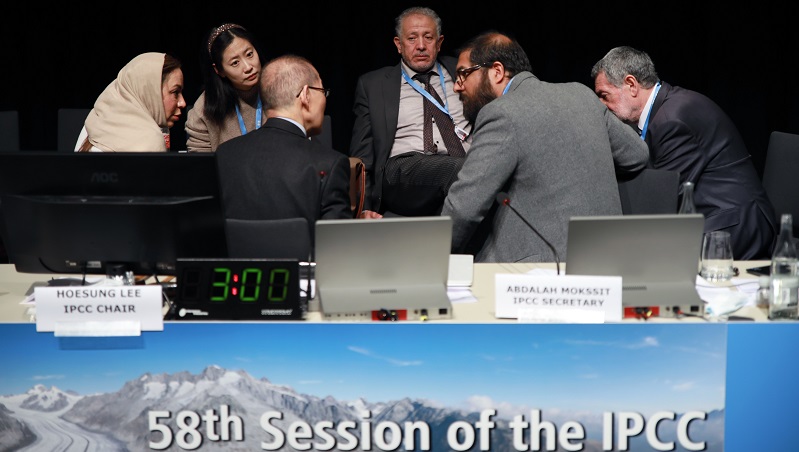While the Saudis pushed carbon capture and storage technology, Europeans fought for wind and solar to be talked up in the report.
Governments fought over how their favoured green technologies are described in the latest report by the Intergovernmental Panel on Climate Change’s scientists last week.
As governments met in Switzerland to approve the report, a group led by Saudi Arabia pushed for an emphasis on sucking carbon out of the atmosphere through carbon dioxide removal (CDR) and carbon capture and storage (CCS) technology.
But a group of mainly European nations pushed for the report to emphasise the role of wind and solar power in fighting climate change and note how much cheaper it has got recently.
Government influence
The IPCC synthesis report summarises the latest scientific knowledge on climate change.
Alongside the full report, the IPCC publishes a shorter document called the “summary for policy-makers” which is approved by governments at a week-long session in the Swiss city of Interlaken.
Nations fight to be called climate vulnerable in IPCC report
Although the scientists who wrote the report are in the room to push back, government negotiators regularly try to lobby for the inclusion of their priorities in the text. The report needs to be approved line-by-line.
Cost-effectiveness
A think tank called IISD is the only organisation allowed to report on the talks.
According to their summary, a group of European nations wanted the report to say that solar and wind electricity “is now cheaper than energy from fossil fuels in many regions”.
Germany said this sentence was of “paramount” importance but, according to IISD, Saudi Arabia “strongly opposed inclusion of the sentence”.
IPCC highlights rich nations’ failure to help developing world adapt to climate change
The Bahamas’ representative called for the report to say specifically that CCS technology, unlike wind and solar, is not getting cheaper.
But Saudi Arabia pushed back, saying that CCS and CDR are “in fact unavoidable”.
The paragraph they were debating ended up referring to “sustained decreases” in the cost of solar, wind and batteries without mentioning CCS or CDR.
Carbon capture
While CDR sucks carbon out of the general atmosphere, CCS sucks it out of a polluting source like a power plant’s smoke-stack.
Lili Fuhr, from the Center for International Environmental Law, told Climate Home that CCS was the “first line of defence” for the fossil fuel economy.
Saudi Arabia has a history of promoting CCS in IPCC reports and in UN climate talks.
In April 2022, it successfully lobbied for a stronger emphasis on CCS in the IPCC’s report on solutions to climate change.
Loss and damage committee ready to start talks following Asian nominations
When Germany tried to reduce the emphasis on CCS in one paragraph and called for the inclusion of more information on the limits of the technology, Saudi Arabia pushed back.
According to IISD, the oil-reliant nation said “any additional context on CCS should include benefits”.
In an extensive footnote, the final report notes that implementation of CCS currently faces “technological, economic, institutional, ecological-environmental and socio-cultural barriers”.
It describes CCS as a “mature technology” for gas processing and enhanced oil recovery, but less so in the power, cement and chemicals sectors “where it is a critical mitigation option”.
The repor
Read More

